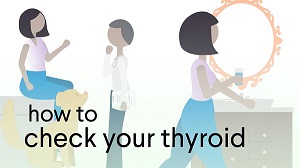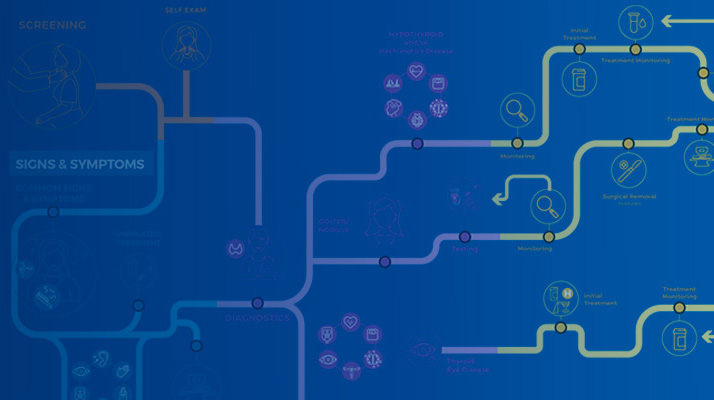What Is Hashimoto's Disease?
Hashimoto’s thyroiditis (also called Hashimoto's disease or chronic lymphocytic thyroiditis) is the most common thyroid disease in the United States. It is an inherited condition that affects over 10 million Americans. It is about seven times more common in women.
Hashimoto’s disease involves the production of immune cells and autoantibodies by the body’s immune system that can damage thyroid cells and compromise their ability to make thyroid hormone. Hypothyroidism occurs if the amount of thyroid hormone produced is not enough for the body’s needs. The thyroid gland may also enlarge, forming a goiter.
What Causes Hashimoto's Disease?
Hashimoto’s disease results from a problem with the immune system. When working properly, the immune system is designed to protect the body against invaders such as bacteria, viruses and other foreign substances. The immune system of someone with Hashimoto’s thyroiditis mistakenly recognizes normal thyroid cells as foreign tissue and produces immune cells and antibodies that may destroy these cells.
What Are Common Symptoms of Hashimoto's Disease?
Hashimoto’s disease may not cause symptoms for many years and may remain undiagnosed until an enlarged thyroid gland or abnormal blood tests are discovered as part of a routine examination. When symptoms do develop, they are either related to local pressure in the neck caused by the goiter itself or to the low levels of thyroid hormone. The antibodies themselves do not cause symptoms.
The first sign of this disease may be painless swelling in the lower front of your neck. This enlargement may cause an uncomfortable pressure in the lower neck. This pressure on surrounding structures may cause additional symptoms, including difficulty swallowing.
Although many of the symptoms associated with thyroid hormone deficiency occur commonly in patients without thyroid disease, patients with Hashimoto’s disease who develop hypothyroidism are more likely to experience the following:
- Fatigue
- Drowsiness
- Forgetfulness
- Difficulty with learning
- Dry, brittle hair and nails
- Dry, itchy skin
- Puffy face
- Constipation
- Sore muscles
- Weight gain
- Heavy menstrual flow
- Increased frequency of miscarriages
- Increased sensitivity to cold
How Is Hashimoto's Disease Diagnosed?
A doctor can detect a goiter by performing a physical examination. They will also be able to recognize hypothyroidism by identifying common symptoms, finding typical physical signs and performing laboratory tests.
An endocrinologist is a specially trained doctor who is qualified to diagnose and treat hormone-related conditions, including diseases related to the thyroid gland. Find endocrine care in your area.
What Tests Are Used to Help Determine Hashimoto's Disease?
- Anti-thyroid antibodies: Testing for increased anti-thyroid antibodies (usually anti-thyroid peroxidase or anti-thyroglobulin antibodies) can confirm Hashimoto’s disease, but the antibodies are not present in all cases.
- TSH (thyroid-stimulating hormone or thyrotropin) test: Increased TSH level in the blood is the most accurate indicator of hypothyroidism. The level of TSH rises dramatically when the thyroid gland underproduces thyroid hormone.
- Estimates of thyroxine (T4) test: This measures the level of T4 in your blood. A low level of free T4 is consistent with thyroid hormone deficiency. However, free T4 values in the “normal range” may still represent thyroid hormone deficiency in a particular person, since a high level of TSH stimulation may keep the free T4 levels “within normal limits” for many years.
Visit our Journey for Patients with Thyroid Disease to learn more about Hashimoto's disease diagnosis.
Learn More
How Is Hashimoto's Disease Treated?
If you have hypothyroidism as a result of Hashimoto’s disease, thyroid hormone therapy is needed since proper dosage usually corrects any symptoms due to thyroid hormone deficiency. Thyroid hormone therapy is not needed if the thyroid is functioning normally, since it doesn't help with symptoms in that setting.
Treatment of hypothyroidism caused by Hashimoto’s disease generally consists of taking a single daily tablet of levothyroxine. It is essential to take them as prescribed each day.
Older patients who may have underlying heart disease are usually started on a low dose of levothyroxine and gradually increased, while younger, healthy patients can be started on full replacement doses at once if the blood work shows that it’s necessary.
Your doctor will need to precisely adjust your hormone dosage based on lab tests, since the body is sensitive to even small changes in thyroid hormone levels.
- If the dose is too low, the thyroid gland may enlarge, and symptoms of hypothyroidism will continue. This may cause increased serum cholesterol levels, possibly increasing the risk for atherosclerosis and heart disease.
- If the dose is too strong, it can cause symptoms of hyperthyroidism, creating excessive strain on the heart and an increased risk of developing osteoporosis.
While you may improve within a week, the full impact of thyroid medicine usually takes time. For example, skin changes may take up to 3-6 months to resolve. Because hypothyroidism due to Hashimoto’s disease is usually permanent, lifelong treatment is generally needed. Dosage of treatments may have to be adjusted from time to time.
Visit our Journey for Patients with Thyroid Disease to learn more about Hashimoto's disease treatment options.
Learn More


